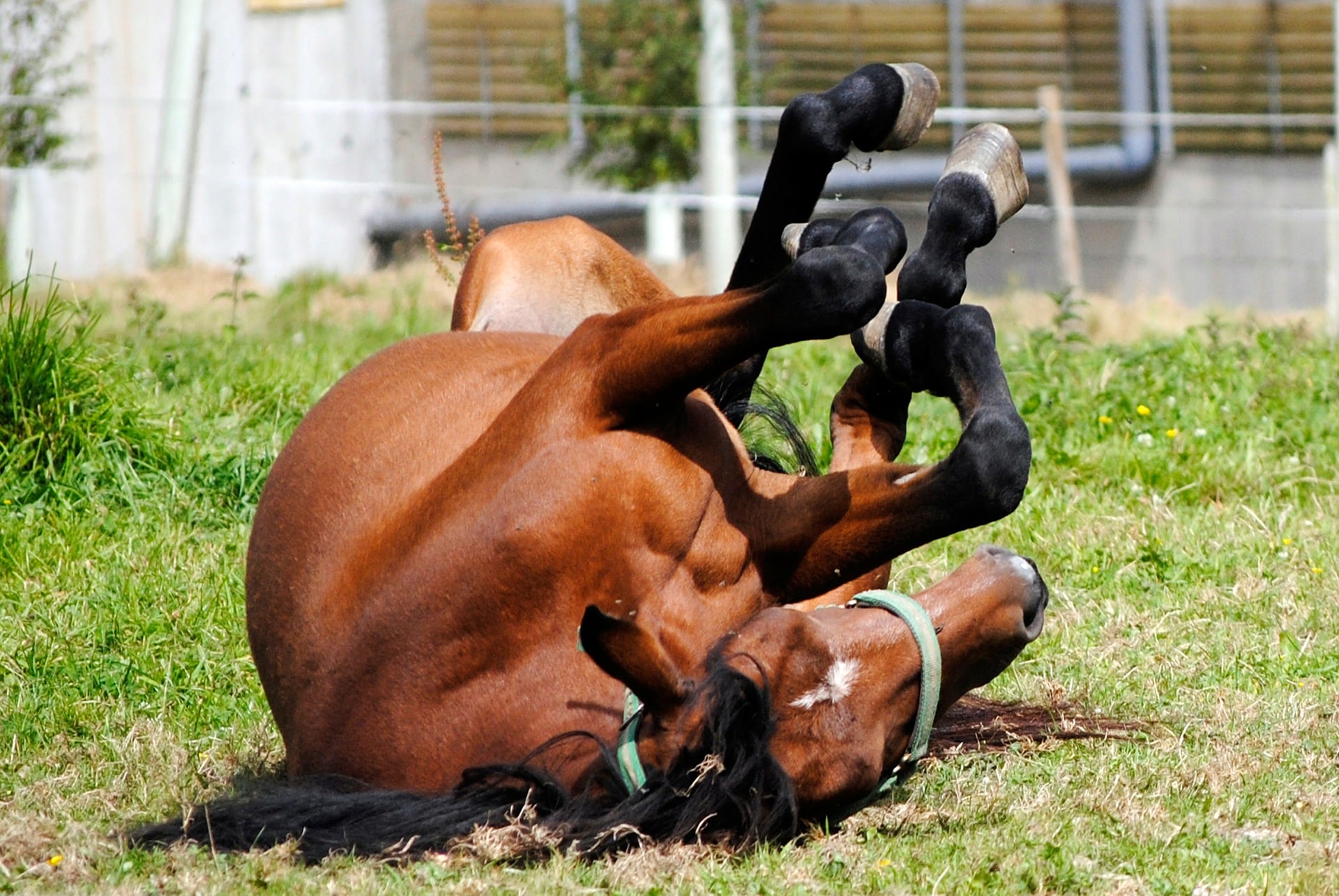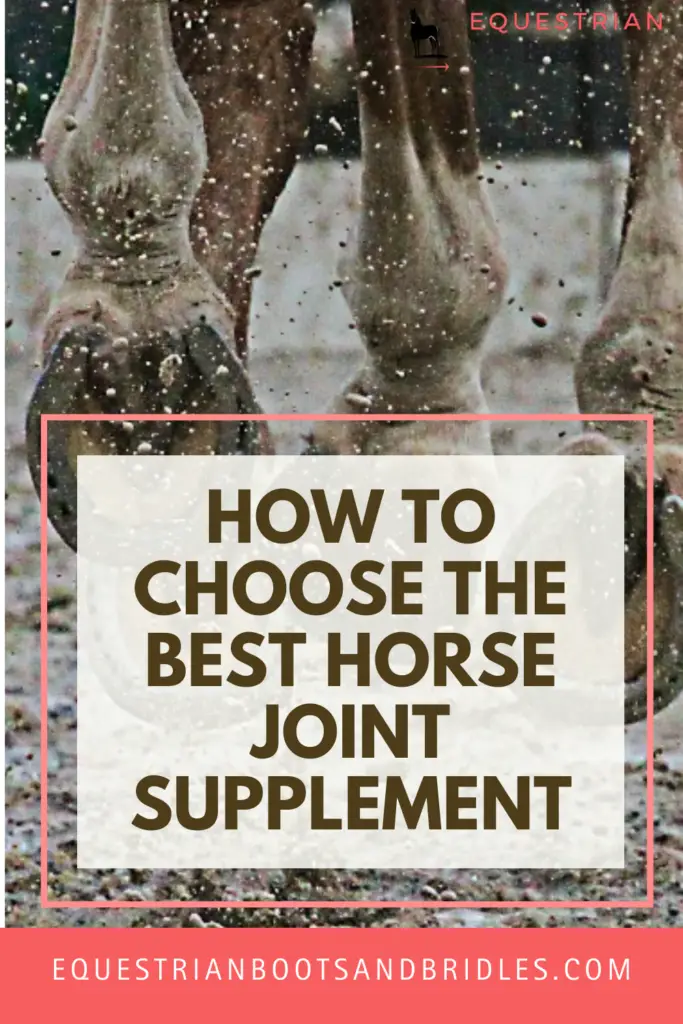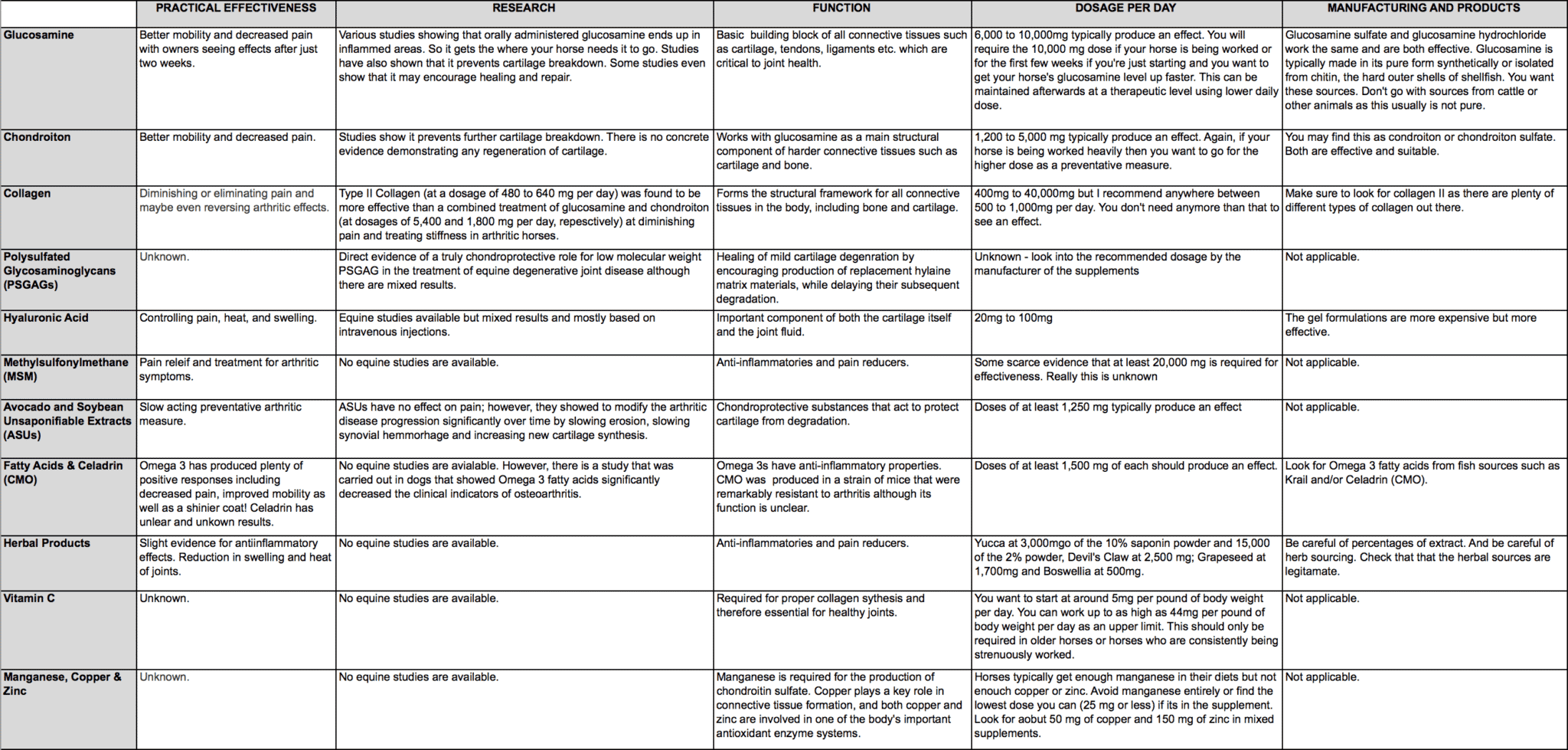Much like human supplements, horse joint supplements contain key ingredients such as hyaluronic acid, chondroitin, glucosamine, omega fatty acids, and collagen. These compounds help promote healthy joint function through cartilage maintenance and repair.
Also, much like human supplements, it’s not always clear how to choose the best horse joint supplements. But don’t panic! We can go through this step-by-step together.
In this post, I go through in-depth research I’ve done for myself through scientific articles published in peer reviewed journals. If you want my recommendations of exactly what brands to buy, check out my joint supplement reviews: Best Horse Joint Supplement Reviews | What To Buy Your Horse
Basic Information
What are these supplements for?
Most of the components found in a horse joint supplement are essential in normal cartilage function. Your horse’s body – and your body! – should make most of them naturally or acquire them naturally through a daily diet. However, even if everything is functioning normally, sometimes the body can’t keep up with the wear and tear of everyday life. This is particularly true for horses as they spend almost all their time on their hooves.
Horses that train often, compete in shows and races are even more susceptible to arthritic cartilage degradation and joint pain over time. The key to getting the right horse joint supplement is knowing what you want to achieve.
Are horse joint supplements right for you and your horse?

Many types horse joint supplement that work prevent cartilage breakdown. There are studies that show certain supplements may actually repair damaged cartilage.
Are you looking to prevent damage with a horse whose joints are fairly healthy but is about to start heavy training? Or is your horse already having some difficulties due to arthritic joint pain and cartilage damage?
You’re in luck! We know that horse supplements definitely work…for some horses. Some horses experience significant results, while other horses experience no effect.
Your horse will likely see an effect IF you know some key things. Nutraceuticals, which is the term that covers these types of horse joint supplement, are loosely regulated by the FDA. This causes issues and means that you, as your horse’s owner, will need to do lots of digging.
The main problems with equine supplements
- Plenty of supplements do NOT contain the amounts of products that they say they do.
- Too low of a dose in crucial ingredients will have no effect while continuing to be an expense and delaying more effective treatment.
- They often contain unnecessary and non-beneficial ingredients.
- There are so many to choose from, it’s hard to know which one is best!
Breakdown of the Main Ingredients in Equine Supplements
Key notes to remember
- Glucosamine and chondroitin work significantly better when given together rather than separately. This means that the effect when they are together is greater than the additive effect of each of them given alone.
- Collagen II, PSGAGs and glucosamine are the only supplements that have shown evidence of promoting regeneration. Other supplements simply prevent further damage.
- ASUs are great for long term preventative care. Start your horse on these early if you are planning on doing a lot of strenuous activity with them.
Step by Step Guide: How to Choose the Best Horse Joint Supplement
Now that you know roughly what works and what doesn’t and how much of it you need, you’ll need to start searching for the right supplement for your horse.
Step 1: Read the label
You need to verify that you’re meeting your horses needs. This may be more difficult than it sounds because some supplements will have the right amount of one thing but way too little of another thing. You may find that you’ll have to end up mix and matching.
If you do this, I recommend getting one mixed supplement that comes as close as you need to most of your compounds. Then buy whatever else you need as pure compound.
For example, if you are just missing 1,000 mg of chondroitin then get a pure chondroitin product and add whatever amount you have to add on top of your all-in-one supplement.
This just makes it easier, cheaper and there’s less “stuff” you don’t know about floating around in mixed supplements.
Step 2: Dig deeper
You need to be looking into products very carefully before you choose to buy anything. Read reviews and forums. I would recommend spending 30 minutes to an hour on each supplement you are looking at seriously to try and figure out whether it’s delivering what it says it is.
Keep in mind you will see good and bad reviews for everything. Just because that supplement didn’t have an effect for someone else’s horse doesn’t mean it may not be effective for yours. They may not have done their research and were dosing improperly.
What you are really looking for here is whether the company is reliable. Whether their label is legitimate and dependable. How long they have been around on the market. Whether they have been successful and acquired trust throughout the equine community. If you can answer yes to these questions, then you’ve probably got yourself a good product.
Step 3: Test, test and test again until you get it right
Run a test period with your horse to see whether the supplement works for him or her. Usually, you will see an effect within a month. If by the end of the month you are not seeing an effect, then consider switching and trying a new supplement.
Safety and Things to Keep in Mind
There is really no direct safety downside to using supplements, except maybe giving too many minerals. There are however, indirect downsides. If you are seeing severe symptoms in your horse, don’t try and fix it yourself using supplements.

A horse joint supplement is meant for just that – to supplement whatever normal routine you have going. For things like osteoarthritis, lameness, severe stiffness, and reluctance to move at all, you want to get your horse to a vet.
Hoping to resolve a serious issue with supplements is just giving the issue time to worsen without appropriate, tailored care.
At the same time, you want to note that vets will all have different opinions about nutraceuticals. I don’t necessarily recommend following their advice exactly on whether or not you should use supplements or which ones to use. You can definitely take suggestions but do your own research and make your own decision.
Vets aren’t going to have the time to look into your horse’s specific needs like you do. And they’re going to have a different opinion than every other vet just because the science behind these supplements isn’t strong enough to back up one single angle. It’s all about what works for your horse! Once you find it, stick with it.
My Conclusion on How To Choose Horse Joint Supplements
If you are going to be working your horse, you may seriously want to consider starting them on some sort of supplement product(s). Remember that the real magic behind most of these these compounds that’s really been proven is the ability to PREVENT degradation, not necessarily to repair it.
Combine the compounds that your horse needs keeping in mind that certain compounds are significantly more effective together than separate. Remember to find a supplement with collagen. These are not as easy to find but collagen has shown the highest and clearest effect in studies to date. Also make sure you’ve done your math right and your horse is getting the correct daily doses.
I wrote another post shortly after this one to respond to certain comments I had gotten below on exactly which brands of horse joint supplements I would choose based on the activity level and health of your horse. You can check it out here for my recommendations.
Equine Research References and Other Sources Used
- http://www.ncbi.nlm.nih.gov/pubmed/18295513
- http://www.ncbi.nlm.nih.gov/pubmed/18692410
- http://www.ncbi.nlm.nih.gov/pubmed/12405690
- http://www.ncbi.nlm.nih.gov/pubmed/15892231
- http://www.ncbi.nlm.nih.gov/pubmed/20444013
- http://www.ncbi.nlm.nih.gov/pubmed/2337277
- http://www.ncbi.nlm.nih.gov/pubmed/22404506
- http://www.ncbi.nlm.nih.gov/pubmed/19927591
- http://www.horsefeedblog.com/2011/03/omega-fatty-acids-what-do-they-do-for-horses/
- http://www.equinearthritis.com/jointsupplements.html
- http://thenaturallyhealthyhorse.com/joint-supplements-horses/
- http://gettyequinenutrition.biz/Library/OlderHorsesNeedSupplementalVitaminC.htm
- http://www.equisearch.com/article/joint-supplements-horses-18712
Please comment below if you have anything to add, any products that you would recommend or if you have any questions! Also you can tell me a little bit about your particular situation and I’ll try and help out.
Other Posts You Might Like on Supplements…
- Best Horse Joint Supplement Reviews | What To Buy Your Horse
- Should You Care About Horse Supplements?
- Types of Horse Supplements and What They Do
- Vitamin E For Horses: The 3 Reasons You’re Going To Need It!
- Vitamin E for Horses: Why Health-E Is My Favourite Brand
- The Best Horse Supplements | Our Gallery
Happy riding 🙂
-Martina
Like this Post? Save it on Pinterest. Follow me on Pinterest.




Hi Martina,
What a great post and very informative. We just ‘inherited’ a horse (long story…). And we are researching a lot to provide this little one the best we can offer
I was wondering at what age would you start giving joint supplements?
Just like supplements for humans, there are different quality and brands. What brand do you use?
Hi TerrbyB!
Thanks for your comment and positive feedback 🙂 Awww thats good to hear! And it really depends on what you have planned for the horse? Do you think you’ll be showing him/her or working him/her heavily? And when?
If your horse will be worked lightly or intermittently, you can either elect to not put your horse on a supplement, which is fine! If you want to be on the safe side, you probably want to start after a few years of riding. And start LIGHT – with a brand like Nutramax’s Cosequin (the original or maybe MSM supplemented).
If you plan on working him/her more later on, then either upgrade the Cosequin or add an independent ASU just for preventative measures.
If you know that your horse is going to be ridden a lot and is going to undergo significant wear and tear on his/her joints, I would start with the Cosequin Plus as soon as you start the intensive work. I like this brand because they are completely transparent with all their ingredients, and they show their research, which lots of companies don’t do.
For some horses, their formulation simply isn’t potent enough, however, in which case you can try Cortaflex (buy the larger dose and split into quarters to save money) and/or get an independant Collagen II supplement.
Collagen has by far had the best scientific results when administered orally, the issue is there aren’t many Collagen II supplements out there. I’ve found some used by bodybuilders and included in an equine formulation that I can’t find any proper research on so as you can imagine I’m not overly encouraged by the brand. Here are the links incase you are interested in looking: veggie-derived collagen, chicken-derived collagen and equine supplement with collagen in it
I’ll try and get out a post on this soon and keep digging regarding the Collagen! Hope I was helpful though! Let me know if you have any other questions – cheers,
Martina
Hi Martina,
I really enjoyed this post on choosing horse joint supplements. I wonder if you have a recommendation for older horses? My quarter horse turned 29 this year. He has been part of the family for 23 years I so am very keen on keeping him comfortable 🙂 His overall health is very good and his lameness is not severe but he does have stiffness.
Hi Linda,
Thank you for your comment and positive feedback! That’s truly a great age, I’m sure you and your family are very attached and proud of him 🙂 Normally, at that age I would recommend a collagen supplement for sure but I’m still having trouble finding a really good one you can get online (if you look at my comment above you can see some of the ones I’ve found and they aren’t that reputable). Also since your horse only has some stiffness with good health, I don’t know if he’d even need it.
So I would say, go with Cosequin – either the original or maybe MSM supplemented. Probably in your case the original should be just fine. It’s a relatively mild supplement, and the site is super transparent and shows all label info as well as straight up displays its research. Some horses don’t feel any effect off of it but I think in your case it should be just fine. Try the original and then if you are still noticing stiffness in about a month then up to the MSM supplemented. If you still see no improvement then e-mail me at [email protected] and I’ll recommend something else for you 🙂
I hope this helps! I’m coming out with a new post this week an some reviews since this is the second comment I’ve gotten requesting recommendations. So check it out if your interested!
Cheers,
Martina
I forgot to ask if there is any supplement company which guarantees results for horses or are the chances the same as supplements for humans? As someone who has worked in a healthcare shop which sold health supplements I absolutely agree that its imperative that you check the effectiveness of the product
Yup there definitely are! Acti-flex 4000 which I talk about here has a satisfaction guarantee on it, but Cosequin doesn’t. Although Cosequin does have plenty of research backing the results that it claims to produce.
I totally agree! The best way I think is to get as much information as you can, make an informed choice based on both the supplement and your horse’s needs and if it works, great! If not, then move on to the next best product.
Great post, thank you.
I have just found out my boy has had had major trauma to his hindquarters. So the muscle stabilising his stifle is non existent. This means there could be cartilage damage to his stifle joint. He is only 6 years old. Can you recommend something that might help regenerate his cartilage if damage has been done.
Thank you for your time.
Hi Megan – I’m so sorry to hear that. That sounds really hard on both of you. Unfortunately, with that kind of damage I would really advise taking him to see a vet which I’m sure you have already. See what the vet says and if they can lay out a plan for you. The problem is supplements are just that – to supplement – and as great as they can be for preventing damage and maintaining joint integrity, they’re not as good for repairing large amounts of damage that has already taken place. Nonetheless, it doesn’t hurt to try so in your case I would recommend: Cosequin ASU Plus. You can read more about it here: https://equestrianbootsandbridles.com/best-horse-joint-supplement-reviews-what-to-buy/ under heavily trained horses. Also if you can ask your vet about a collagen supplement, then I would also use that.
I really hope that helps!!!!
Martina